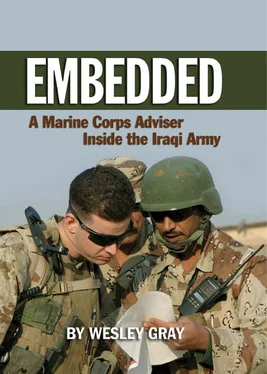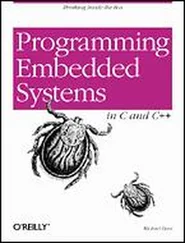Sa’ed knocked on the door and I heard him say, “Jamal, shlonek? Anii Sa’ed.” (Jamal, how are you? This is Sa’ed.) He sounded like something was wrong. I quickly opened the door, and immediately the uninvited Abdulrachman greeted me. “As salam aleikum, sadeeki. Shlonek? Shlon sahtek?” (Hello, my friend. How are you? How is your health?)
I was disgusted. Sa’ed looked at me, shrugged, and defended himself in terrible English. “Sorry, Jamal. He come, Jamal. Me no stop.” Abdulrachman said, “Can I call my family? Can I have some of your food?” I shot him a nasty look but showed him Arab hospitality nonetheless, saying, “Abdulrachman, sit down, please. Unfortunately, the satellite phone is not working so you will not be able to call your family [a total lie]. If you want some food you can have whatever you would like on my shelf.”
As soon as Abdulrachman sat his ass on the corner of my bed, he started eyeing my food supplies. He dug into everything I owned like a starved raccoon. I stopped him. “Abdulrachman,” I asked, “what’s up man? Are you going to take everything I own?” He responded, “Sorry, Jamal. I will only take a few.” Before the last words could leave his lips, he had dipped his paw into my can of cashews and grabbed a massive handful, spilling half of them on the floor. Corporal Salazar, my roommate, said to him, “Hey, Iraqi dude, get the hell out of here. You are causing too many problems!”
My proposed meeting with Sa’ed, which was my attempt to award a jundi who did good work, ended up as a disaster. I pushed everyone out of the room. Everyone slowly left the hooch, grabbing at various articles of clothing and food like professional pickpockets. Everyone except Abdulrachman, who was still loading up on supplies of food. I peered at him. “Abdulrachman, what are you doing? Get out of my stuff! Are you a thief? What is your problem?” He said, “Oh, sorry, Jamal. I am leaving.”
I turned around, expecting Abdulrachman to exit. He didn’t. I turned back around to witness him grabbing one last massive handful of cashews and stuffing his mouth full of jerky. I raised my voice. “Abdulrachman. Out—now!” He sprinted for the exit, flipped a 180, and turned toward me. “Jamal, I want to talk to my family. Give me the satellite phone, okay?” I contemplated grabbing my M-4 and shooting him in the head, but instead I maintained my cool. “Abdulrachman, you will have to speak with Major Pyle about this or ask Colonel Abass.”
Sa’ed realized my frustration with the situation and, risking a beating later on, yelled at Abdulrachman, “Seyidi, Jamal ma yreedna hinah. Yalla, rooh!” (Sir, Jamal doesn’t want us here. Let’s go!) Abdulrachman replied, “Sa’ed, leysh tiHchi illi? Rah arooh shwakit areed. Iskut…. Yalla!” (Sa’ed, why do you talk to me? I will go when I want. Shut up…. Let’s go!)
Abdulrachman was not an aberration. I’d seen similar behavior in the local kids, the local adults, the Sunni Iraqi contractors on our base, and the Shia jundi throughout our battalion. Everyone wanted handouts from the Americans, but nobody wanted to do anything for the handout. Iraqis are survivors. If they can get something for nothing they will latch onto the opportunity. My fear was that on a micro-scale, and probably on a macro-scale, we had become Iraq’s “sugar daddy.”
The begging problem became such an issue for the team as a whole that I began turning away the generosity of Americans back home who had been sending boxes upon boxes of toys, candy, and clothes for the Iraqis. While their gestures were sincere, if they knew how little the Iraqis appreciated their generosity, they would cringe.
“Jamal, help me. Ayad need you help. Ayad need you help, bad. Tigder tisai’edni? “[Can you help me?]” Ayad, a soldier in our battalion, blurted in a mix of English and Arabic. Ayad was in a cold sweat upon his arrival. Floored by the chaos, I replied, “Ayad, calm down, brother. I’ll take care of you.”
I sorted out the situation. Ayad needed to contact his family immediately because a jundi in the battalion heard that Ayad’s family was in serious trouble. Ayad pleaded with me to let him use the satellite phone so he could call his family. At first I thought this might be another Iraqi trick to get something out of me for free; however, Ayad was a good Iraqi and had never begged from me before. I had to help. I grabbed the phone from the MiTT COC and handed it to him.
The story that unfolded was shocking. I understood chunks of the conversation Ayad had with his grandfather, but couldn’t quite believe what I was hearing. I had Ahmed (who escorted Ayad to my living space) fill me in on the details after the conversation was finished.
Ahmed recapped, “Jamal, essentially, every male in Ayad’s family is in jail. Ayad’s eleven-year-old brother, Abdullah, was playing soccer in Najaf against some other kids on the neighborhood soccer field. At some point in the game Abdullah got in a huge argument with a kid on the other team, who happened to be from another tribe. During the game the kid on the other team did something to infuriate Abdullah. Abdullah took matters into his own hands, went home, grabbed the family’s AK-47, and sprinted back to the soccer field. Upon his arrival he unloaded a magazine of 7.62-mm lead into the kid who offended him, killing him in cold blood.”
Astonished, I looked at Ayad and asked, “Akhuek iktelit il waled?” (Your brother killed the boy?) Ahmed interrupted, “Jamal, let me finish the story here.” I said, “Okay, sorry, Ahmed, continue.” Ahmed went on. “So after the killing, the kids all scattered and the local police showed up immediately. When the local police arrived, they immediately apprehended Abdullah and marched directly to his home. The police arrested all of the male relatives at the home and brought them directly to jail.”
I interrupted, “They sent everyone to jail?” Ahmed said, “Yes, Jamal, in Iraq the standard procedure is to put not only the perpetrator in jail, but to put all male relatives of the perpetrator in jail until the situation is solved among the tribal sheikhs. While the males were in jail, the tribal sheikhs representing Abdullah and the kid that was murdered got together to figure out the appropriate blood money to ensure continued peace and harmony between the two tribes.”
I looked at Ahmed, bewildered. He paused a moment then continued. “If no amount is agreed on, the tribe that had the member killed is obligated to conduct a revenge killing against a member of Ayad’s tribe or their honor would be disgraced.” I asked, “What happened?” Ahmed replied, “Thankfully, the tribes came to an agreement—seven million dinar [forty-five hundred dollars]. Ayad’s family will pay four million, and the tribe will pick up the three-million-dinar tab, using the funds received from the tribal taxes. The tribal sheiks have also agreed that once payment is complete, the males in Ayad’s family will be allowed to walk free from jail and the tribes will never talk of the incident again. Great news, isn’t it?”
I wasn’t really sure how to respond and simply replied to appease my Arab friends. “Sure, that sounds… awesome,” I said. “I’m so happy for your family.”
Great news? Were these guys serious? This was the most insane story I’d ever heard in my life. I was still trying to get a grasp on it. At the most basic level, I was convinced that a baby born in America and a baby born in Iraq were the same people, but Iraqis, who live in a complex and demanding environment alien to our own, have developed perspectives on life and society that bear no resemblance to those of Americans. I had learned many things from my experiences to date, but there was one overarching theme: Iraqi culture is not Western culture and never will be. My Uncle Richard, a retired Navy man, sent me an e-mail that says it all:
Читать дальше












